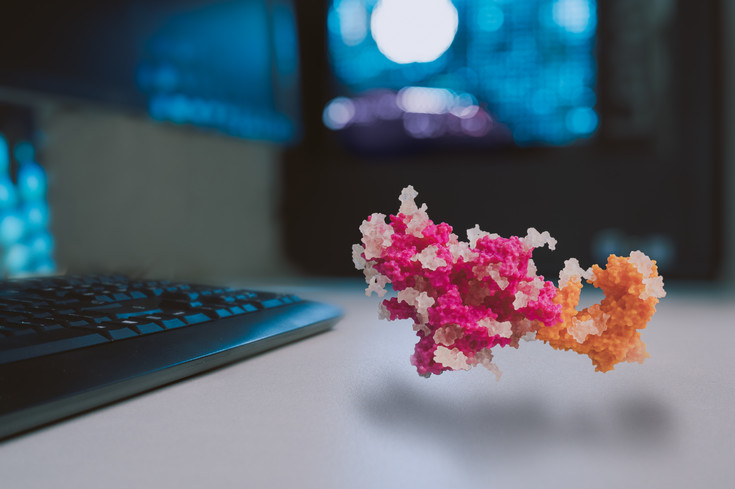22.12.2021 - Austrian researchers release the "sugar brake" and develop highly effective SARS-CoV-2 receptor mock-up

3D-printed molecular structural model of the interaction of human ACE2 with SARS-CoV-2 Spike protein, developed by the MMS at BOKU, Vienna (c) the cloning company
University of Natural Resources and An interdisciplinary research team with the participation of BOKU has calculated and experimentally determined the influence of sugar structures on the docking of the coronavirus to the receptor protein ACE2. It has been shown that some of these sugar chains of the receptor protein stand in the way of the virus and thus "slow down" its docking, which has far-reaching significance in the fight against the coronavirus.
In order to invade human cells, the SARS-CoV-2 virus attaches to a specific surface protein called ACE2. In its natural state at the cell surface of lung cells, this protein normally carries several sugar chains that are critical for its production, maturation, stability and function in and on human cells.
In a recent study published in the journal eLife, an interdisciplinary team of Austrian researchers with participation of BOKU - based on molecular 3D simulations - has now calculated and experimentally determined the possible influence of these sugar structures on the docking of the coronavirus to the receptor protein ACE2. It was shown that some of these sugar chains of the receptor protein stand in the way of the virus and thus "slow down" its docking.
These basic research results have far-reaching significance in the fight against the coronavirus: one therapeutic approach pursued by the Viennese start-up Apeiron consists of administering artificial, non-cell-surface-bound ACE2 to allow SARS-CoV-2 to dock not to the human cell surface, but to itself. This deflects the virus, so to speak, and does not infect any other cells. In order to make this therapeutic approach, which can be applied to all SARS-CoV-2 mutations, even more successful, researchers at the University of Natural Resources and Life Sciences, Vienna, have now released the "sugar brake" on the artificial variant of ACE2 ("Apeiron APN01") and thereby tailored an even better, so-called "decoy" receptor, a mock receptor.
The improved virus-neutralizing properties of this "sugar-free" compound against the SARS-CoV-2 virus were verified in cell culture infection studies in biological high-security laboratories in collaboration with the Medical University of Graz and the Karolinska Institute in Sweden.
"Protein-bound glycans have been an important research focus at several departments of the University of Natural Resources and Life Sciences, Vienna for decades. The associated 'Zuckerl expertise' on site has contributed significantly to the development and success of this great collaborative project," emphasizes Johannes Stadlmann, project leader at the Institute of Biochemistry at BOKU.
"This project has brought together experts from a wide range of fields. In addition to the four BOKU departments (Molecular Modeling, Applied Genetics and Cell Biology, Chemistry and the BOKU Core-Facility Biomolecular & Cellular Analysis), the collaboration involved Kurt Zatloukal at the Medical University of Graz, Ali Mirazimi at the Karolinska Institute in Sweden, Josef Penninger at the University of British Columbia, in Vancouver, and the Viennese start-up Apeiron Biologics were extremely important," sum up Chris Oostenbrink from the Institute of Molecular Modeling and Simulation and Lukas Mach from the Institute of Plant Biotechnology and Cell Biology at BOKU.
"Structure-guided glyco-engineering of ACE2 for improved potency as soluble SARS-CoV-2 decoy receptor”, eLife 2021;10:e73641 doi: 10.7554/eLife.73641
https://elifesciences.org/articles/73641
Contacts
Dr. Johannes Stadlmann (Project Manager)
University of Natural Resources and Life Sciences, Vienna
Institute of Biochemistry
Email: johannes.stadlmann(at)boku.ac.at
Univ.Prof. Dr. Chris Oostenbrink
University of Natural Resources and Life Sciences, Vienna
Institute for Molecular Modeling and Simulation
Email: chris.oostenbrink(at)boku.ac.at
Univ.Prof. DI Dr. Lukas Mach
Applied Life Sciences Vienna
Institute for Plant Biotechnology and Cell Biology
Email: lukas.mach(at)boku.ac.at
